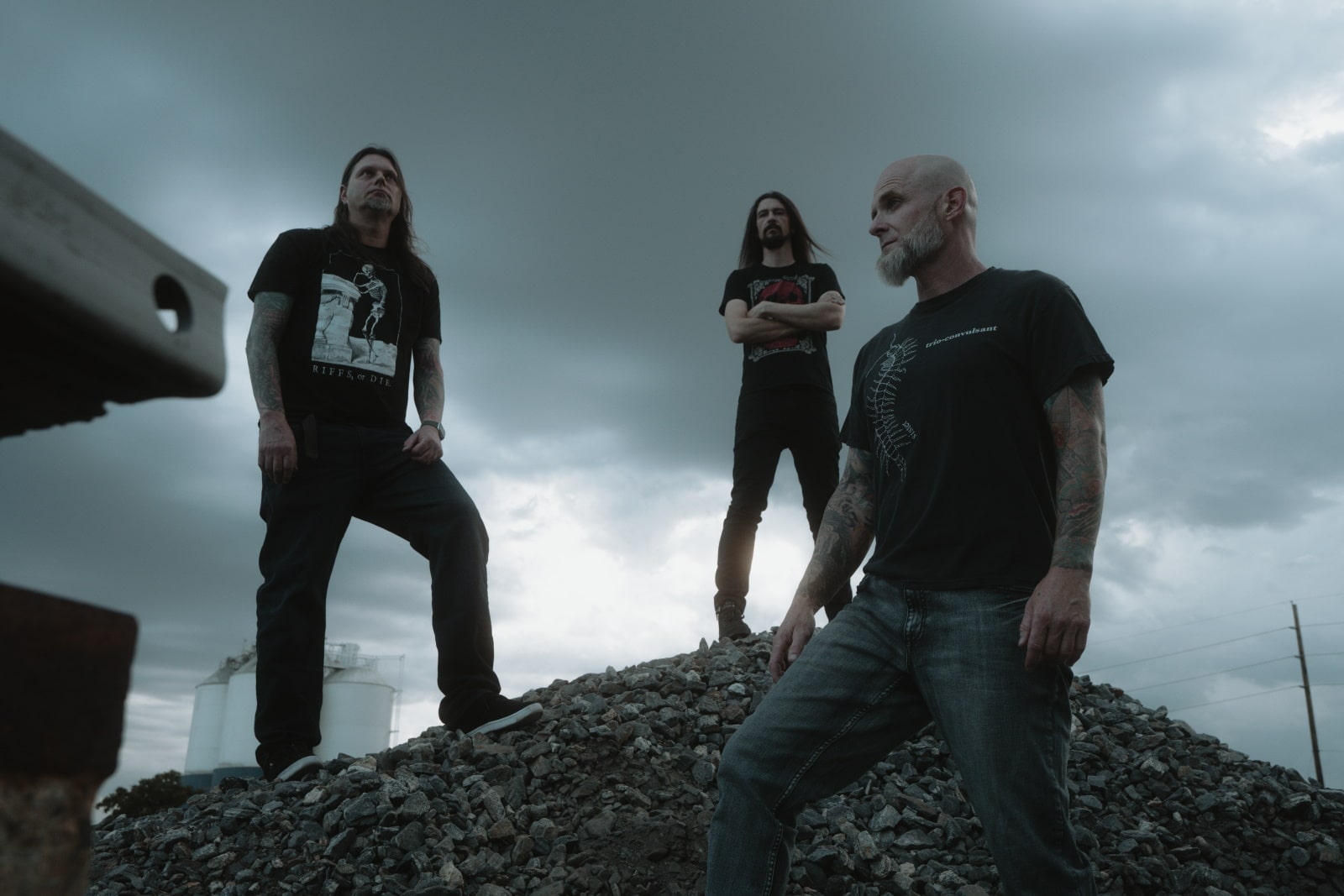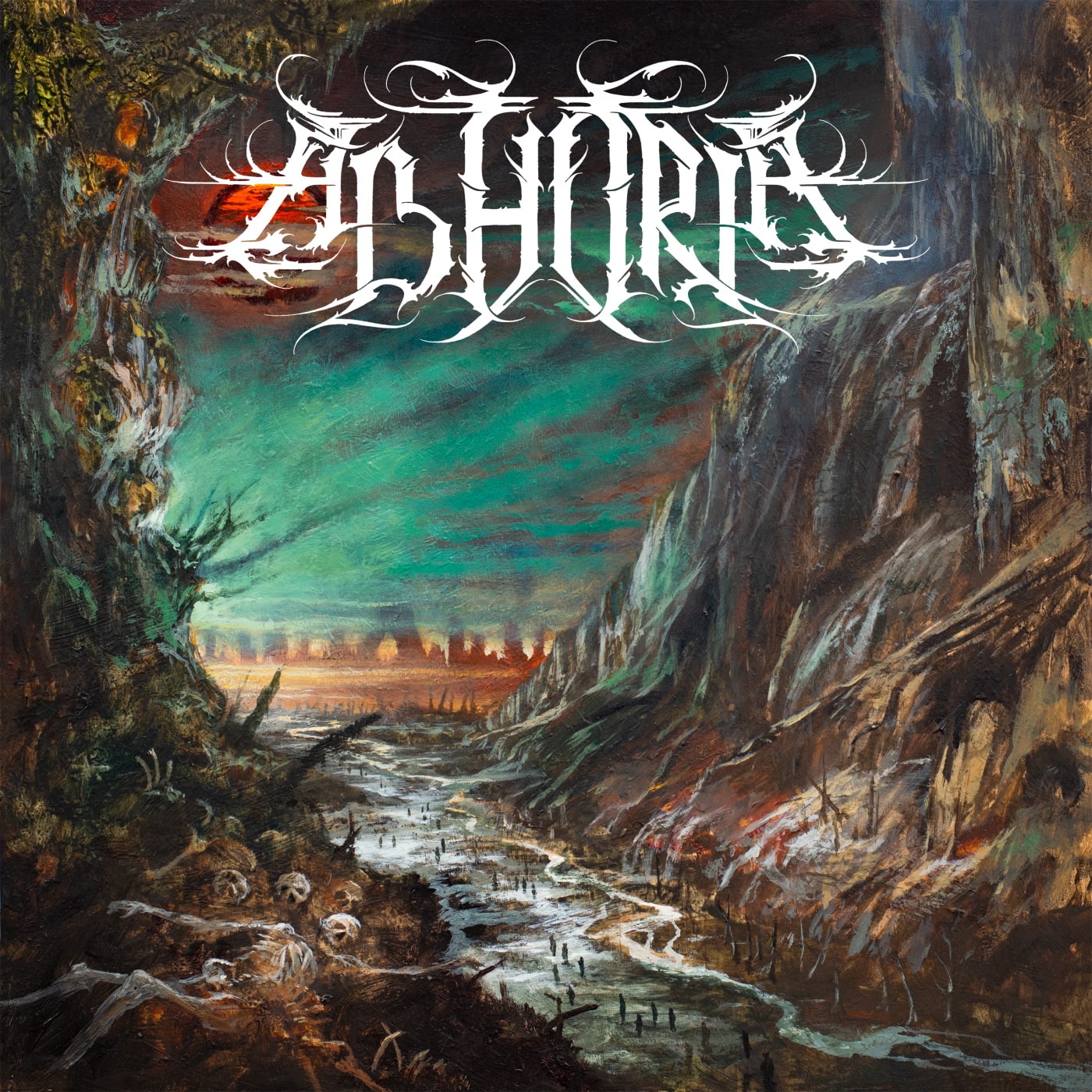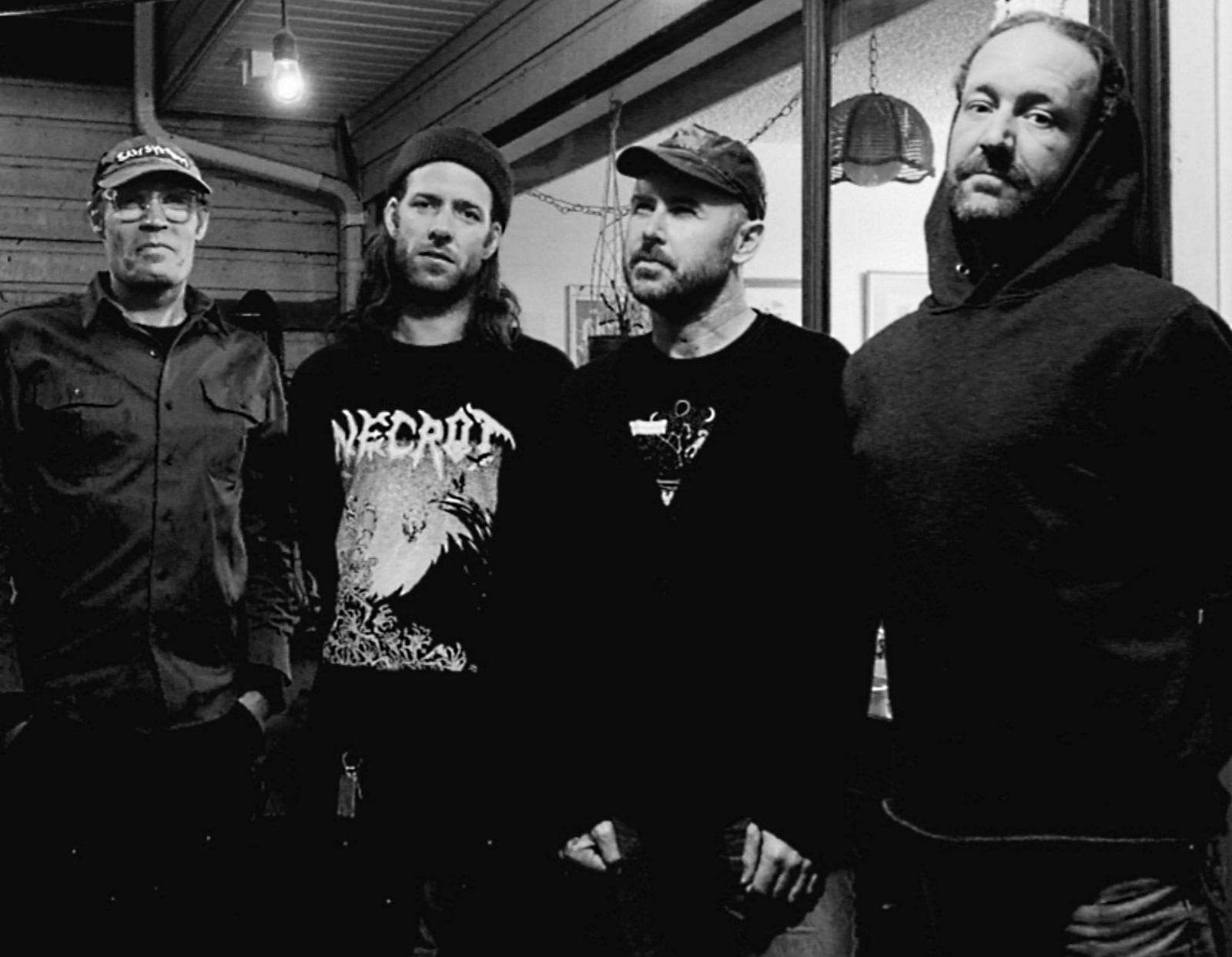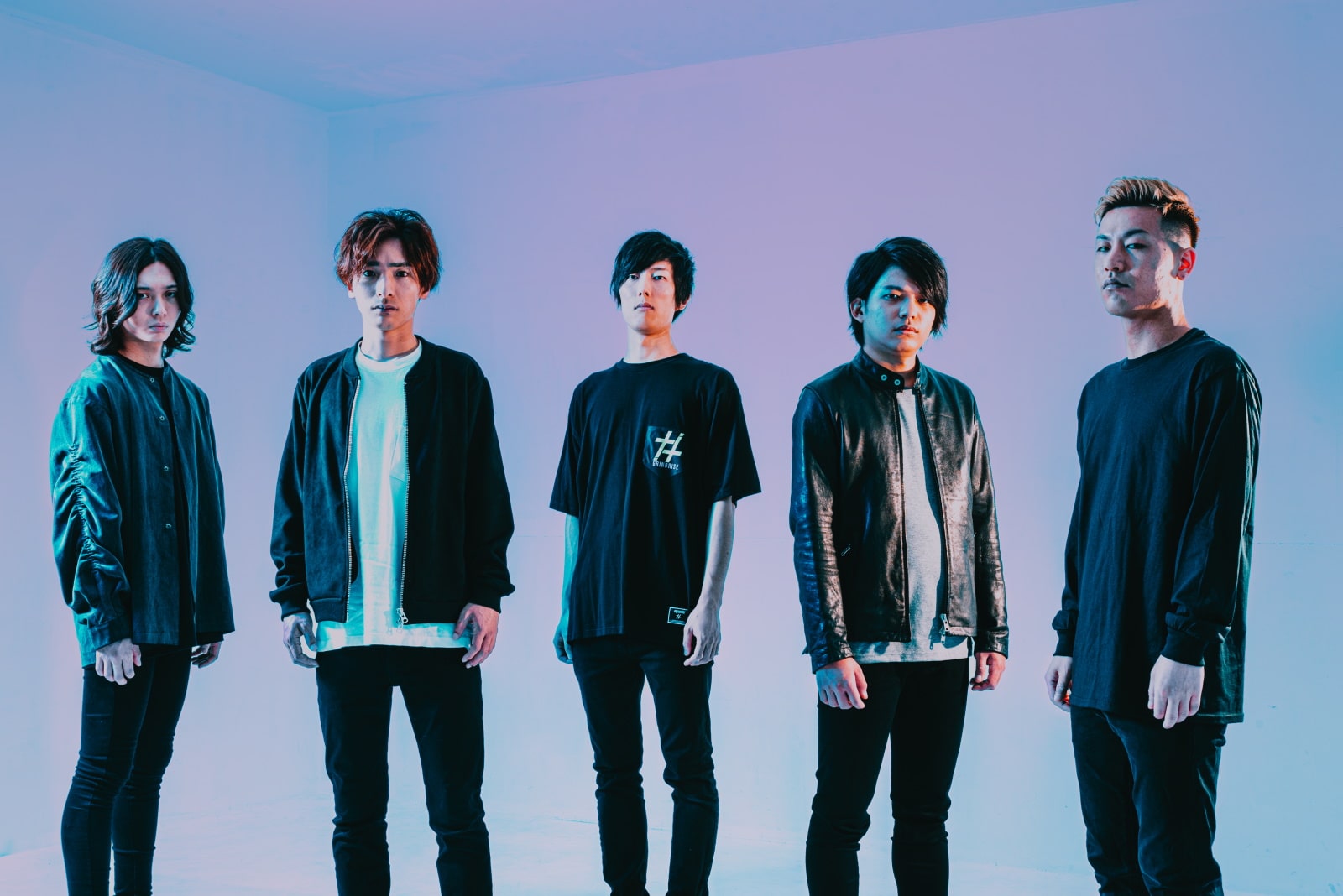Having recently inked a deal with Prosthetic Records, dystopian black metal trio, ABHORIA, are releasing their self-titled debut album today, and we’re pleased to give you a special track by track rundown for this behemoth of a release below!
Featuring members of Ashen Horde, Catheter and Vimana, ABHORIA recorded the album remotely, with each member contributing their elements from afar. In fact, the band only met up – and played together – after the album had been recorded. The record was engineered, mixed and mastered by Shane Howard (Martriden, Helleborus) at Sawn & Quartered Studios; Shane was able to capture the raw brutality of the band, but with a layer of slick, modern metal production. A final visual flourish came courtesy of the distinctive cover artwork by fan-favorite Adam Burke.
ABHORIA’s modern take on a classic genre relies less on traditional black metal tropes and leans toward capturing the bleak landscape of an unforgiving world in sonic form. Through their lyrical storytelling, the band explores the darkest corners of the human psyche across the album’s unrelenting eight tracks. First single, Mountebank, focuses on a con artist offering the promise of a better life for only a “small sacrifice…”. Unevangelized looks at a despondent group fighting back against those offering “salvation” through religion. Grave Expectations explores a mysterious benefactor who lures people in only to hunt them for game. “There’s not a lot of hope on this album; it examines desperate people struggling to survive in an unrelenting world, as well as those who would seek to take advantage of others’ hopelessness,” says guitarist and principal songwriter Vor.
ABHORIA invite you to discard your preconceptions of the genre, and embrace a take on black metal that reflects the relentless bleakness of a world not far from our own.
ABHORIA is: Vor: Guitars, Walthrax: Vocals, Koszmar: Bass, (drums performed by Jaud)
Vor (guitar): The “Abhoria” album is built around the concept of a dystopian world, where the inhabitants are in a constant struggle to survive. The sun is all but blotted out by dense clouds and filthy air. It’s perpetually cold and damp, and resources are beyond scarce. Each song looks at a different aspect of “life” in this world; it examines both those who are merely fighting to endure, and those who find opportunity in others’ anguish.
False Idols
Vor: Knowing what you want to achieve and actually making it happen are very different things. When I decided to start what would become Abhoria, I knew what I wanted: a black metal band that captured what I loved most about the ‘90s black metal that got me into the scene, but ran through a modern filter. My main focus for the previous 8 or 9 years, Ashen Horde, is certainly rooted in black metal, but has drifted pretty far from that over the course of several albums. So I wanted to do something a bit more genre-specific, but hopefully not obviously derivative. The first few attempts at songs ended up in the trash. Maybe a riff or two survived, but it took several months to find the sound I was looking for. “False Idols,” though not the first song that made the cut, was the first one that I felt was EXACTLY what I’d been trying to achieve. The minute I finished it, I knew it would open the album. The rest of the band kicked it up several more notches when we recorded it, and I couldn’t be more satisfied.
Lyrically, this one looks at people who put on the façade that they should be worshipped as gods, and somehow convince others—hopefully only briefly—to treat them as such. But ultimately, they are revealed to be nothing more than frauds and must be brought down. The title was inspired by the book “The Dragon Lords: False Idols,” by my buddy Jon Hollins.
Mountebank
Vor: The main riff here is just pure aggression. I just remember wanting something fast and angry, and that’s what came out; the rest of the song pretty much wrote itself. The lyrics look at someone who prays on hopeless people with the promise of a better life. Of course, there’s always a price to pay, and in the end, the victims are left in an even worse place than they began. This track became our first, and paints a pretty good picture of what the band is all about.
We shot a performance video for this one, which turned out perfectly dark and brutal. It was directed and edited by Igor Borovac, one of my best and most talented friends, who also happens to have been nominated for an Emmy for his editing work in TV.
The Thorn
Vor: This track looks at someone who is absolutely convinced they have something living inside them—is it simply a pain, a growth, or perhaps something parasitic? The obsession with this “entity” slowly begins to drive the host insane. In the context of an album, it’s easy to imagine that someone struggling to survive each day would easily fall into a cycle of paranoia and delusion such as this.
I’m very happy with the music, but made a major faux pas by leaving virtually no break from high-speed picking for the duration of the song. It’s an arm killer!
“The Thorn” has my favorite solo on the album. I love to put very melodic solos over otherwise dissonant songs, and feel like this one came out exactly how I wanted it; I love the juxtaposition of the two vibes.
Byzantine Promises
Vor: This is the “oldest” song on the album in that it’s the first track I wrote for what would become Abhoria that actually made its way to the final track list. You can hear some definite thrash and punk influences in some of the riffs, which made me think twice about including it. But ultimately, I thought those bits worked well with the black metal parts, and created a very intense track. I have to say that Walthrax’s vocals are what really settled it for me—I don’t know how he gets out so many words with one breath… it’s just so vicious and unrelenting.
The title comes from an episode of Penny Dreadful—I actually don’t recall if they used the term exactly or if it was just something similar, but I jotted it down and knew it needed to be a song. Per Walthrax, “it’s a conversation between two conflicting sides, with each side trying to convince the other that their view is correct. But ultimately, there isn’t even a real argument. It’s all about how we are just mirrors of enemies. Are we actually our own worst enemies?”
Grave Expectations
Vor: This was a rarity for me—I actually had the bulk of the lyrics done BEFORE I’d written the music. (I’m usually scrambling to write lyrics on the way to the studio, haha.) For whatever reason, I had this idea to take the premise of Dickens’ “Great Expectations,” and imagine that the benefactor isn’t actually out to help anyone; rather, he lures in a suffering orphan to be the victim in a “human hunt,” and ultimately desires to devour him. Pretentious and silly? Maybe, but it fit well within the theme of the album and inspired some cool riffs. It’s also a nice break from the more blast-beat-centric songs on either side of it.
Unevangelized
Vor: In a world crippled by food shortages, harsh conditions, skies that block out the sun, and a host of other dystopian nightmares, you can guarantee that someone will always be out pushing their religion as a cure all. But when the “bearers of salvation” come across a group of people who immediately see through the lies—and have literally no tolerance left for deceit—things get dark very quickly. It’s sort of a bizarro version of the witch trials; in this case, the peddlers of religion are burned at the stake.
This is probably the most challenging song to play (at least for me). I love experimenting with “bizarre” chords—jazz chords and what not—and this song has a number of them. Trying to move from one weird shape to the next at high speed can be taxing. But I’m happy with how it turned out, and the blasts from our studio drummer Jaud are insane!
Hollow
Vor: Whereas “Unevangelized” was built around challenging chord shapes and changes, “Hollow” was built for speed. The majority of the song is built around a major diminished fifth, which sounds dark and unsettling, but is easy to slide all around. The groovier middle section certainly stems from my love of stoner rock, albeit through a black metal filter.
Walthrax wrote most of the lyrics here, and I don’t want to misinterpret his words, but my original idea was to write something from the perspective of someone who has not only lost hope, but all emotion. They feel they’re little more than an empty shell drifting through “life” with no connection to anyone or anything.
Sunless
Vor: While I knew I wanted to write a relatively relentless album, I also knew I wanted to close it with something a bit more epic. Tracks like “Beyond the North Waves” from Immortal’s Sons of Northern Darkness and “The View of Everlast” from Borknagar’s “Empiricism” closed otherwise intense albums on a more restrained note, which I found extremely effective. It also felt like a good way to build a song focused less on individuals living in the dystopia on which the album is based, instead looking at the world more holistically. Walthrax really ran with the lyrics, and came with some awesome lines. “A therianthropic stinging…” Awesome.
I was initially opposed to any clean singing on the album, but changed my mind when I heard an early mix of the song. It will likely not be a core aspect of Abhoria’s sound going forward, but I think it works extremely well here.
This was the third single released, and Chariot of Black Moth put together a very unsettling video for it, which I love. It sucks you even further into the world the album seeks to explore.











